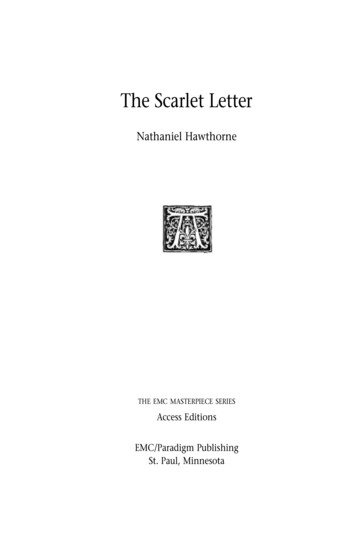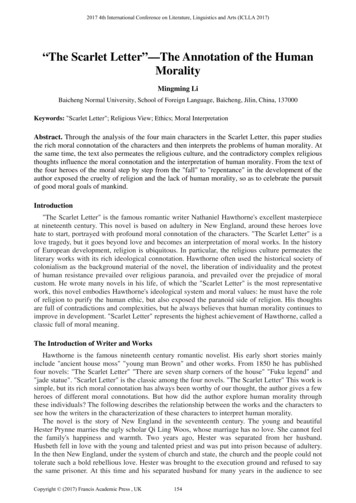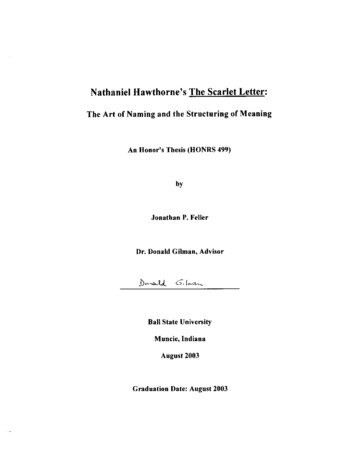
Transcription
The Scarlet Letter by HawthorneThe Scarlet Letter by HawthorneTHE SCARLET LETTERby Nathaniel HawthorneEDITOR'S NOTENathaniel Hawthorne was already a man of forty-six, and a talewriter of some twenty-four years' standing, when "The ScarletLetter" appeared. He was born at Salem, Mass., on July 4th, 1804,son of a sea-captain. He led there a shy and rather sombre life;of few artistic encouragements, yet not wholly uncongenial, hismoody, intensely meditative temperament being considered. Itscolours and shadows are marvelously reflected in his "Twice-ToldTales" and other short stories, the product of his first literaryperiod. Even his college days at Bowdoin did not quite breakthrough his acquired and inherited reserve; but beneath it all,his faculty of divining men and women was exercised with almostuncanny prescience and subtlety. "The Scarlet Letter," whichexplains as much of this unique imaginative art, as is to bepage 1 / 337
gathered from reading his highest single achievement, yet needsto be ranged with his other writings, early and late, to have itslast effect. In the year that saw it published, he began "TheHouse of the Seven Gables," a later romance or prose-tragedy ofthe Puritan-American community as he had himself known it defrauded of art and the joy of life, "starving for symbols" asEmerson has it. Nathaniel Hawthorne died at Plymouth, NewHampshire, on May 18th, 1864.The following is the table of his romances,stories, and other works:Fanshawe, published anonymously, 1826; Twice-Told Tales, 1stSeries, 1837; 2nd Series, 1842; Grandfather's Chair, a historyfor youth, 1845: Famous Old People (Grandfather's Chair), 1841Liberty Tree: with the last words of Grandfather's Chair, 1842;Biographical Stories for Children, 1842; Mosses from an OldManse, 1846; The Scarlet Letter, 1850; The House of the SevenGables, 1851: True Stories from History and Biography (the wholeHistory of Grandfather's Chair), 1851 A Wonder Book for Girls andBoys, 1851; The Snow Image and other Tales, 1851: The BlithedaleRomance, 1852; Life of Franklin Pierce, 1852; Tanglewood Tales(2nd Series of the Wonder Book), 1853; A Rill from the Town-Pump,with remarks, by Telba, 1857; The Marble Faun; or, The Romance ofMonte Beni (4 EDITOR'S NOTE) (published in England under thetitle of "Transformation"), 1860, Our Old Home, 1863; DolliverRomance (1st Part in "Atlantic Monthly"), 1864; in 3 Parts, 1876;page 2 / 337
Pansie, a fragment, Hawthorne' last literary effort, 1864;American Note-Books, 1868; English Note Books, edited by SophiaHawthorne, 1870; French and Italian Note Books, 1871; SeptimiusFelton; or, the Elixir of Life (from the "Atlantic Monthly"),1872; Doctor Grimshawe's Secret, with Preface and Notes byJulian Hawthorne, 1882.Tales of the White Hills, Legends of New England, Legends of theProvince House, 1877, contain tales which had already beenprinted in book form in "Twice-Told Tales" and the "Mosses""Sketched and Studies," 1883.Hawthorne's contributions to magazines were numerous, and most ofhis tales appeared first in periodicals, chiefly in "The Token,"1831-1838, "New England Magazine," 1834,1835; "Knickerbocker,"1837-1839; "Democratic Review," 1838-1846; "Atlantic Monthly,"1860-1872 (scenes from the Dolliver Romance, Septimius Felton,and passages from Hawthorne's Note-Books).Works: in 24 volumes, 1879; in 12 volumes, with introductorynotes by Lathrop, Riverside Edition, 1883.Biography, etc. ; A. H. Japp (pseud. H. A. Page), Memoir of N.Hawthorne, 1872; J. T. Field's "Yesterdays with Authors," 1873 G.P. Lathrop, "A Study of Hawthorne," 1876; Henry James English Menof Letters, 1879; Julian Hawthorne, "Nathaniel Hawthorne and hispage 3 / 337
wife," 1885; Moncure D. Conway, Life of Nathaniel Hawthorne,1891; Analytical Index of Hawthorne's Works, by E. M. O'Connor1882.CONTENTSINTRODUCTORY. THE CUSTOM-HOUSECHAPTER I. THE PRISON-DOORCHAPTER II. THE MARKET-PLACECHAPTER III. THE RECOGNITIONCHAPTER IV. THE INTERVIEWCHAPTER V. HESTER AT HER NEEDLECHAPTER VI. PEARLCHAPTER VII. THE GOVERNOR'S HALLCHAPTER VIII. THE ELF-CHILD AND THE MINISTERpage 4 / 337
CHAPTER IX. THE LEECHCHAPTER X. THE LEECH AND HIS PATIENTCHAPTER XI. THE INTERIOR OF A HEARTCHAPTER XII. THE MINISTER'S VIGILCHAPTER XIII. ANOTHER VIEW OF HESTERCHAPTER XIV. HESTER AND THE PHYSICIANCHAPTER XV. HESTER AND PEARLCHAPTER XVI. A FOREST WALKCHAPTER XVII. THE PASTOR AND HIS PARISHIONERCHAPTER XVIII. A FLOOD OF SUNSHINECHAPTER XIX. THE CHILD AT THE BROOK-SIDEpage 5 / 337
CHAPTER XX. THE MINISTER IN A MAZECHAPTER XXI. THE NEW ENGLAND HOLIDAYCHAPTER XXII. THE PROCESSIONCHAPTER XXIII. THE REVELATION OF THE SCARLET LETTERCHAPTER XXIV. CONCLUSIONTHE CUSTOM-HOUSEINTRODUCTORY TO "THE SCARLET LETTER"It is a little remarkable, that--though disinclined to talkovermuch of myself and my affairs at the fireside, and to mypersonal friends--an autobiographical impulse should twice inmy life have taken possession of me, in addressing the public.The first time was three or four years since, when I favoured thereader--inexcusably, and for no earthly reason that either theindulgent reader or the intrusive author could imagine--with adescription of my way of life in the deep quietude of an OldManse. And now--because, beyond my deserts, I was happy enoughpage 6 / 337
to find a listener or two on the former occasion--I again seizethe public by the button, and talk of my three years' experiencein a Custom-House. The example of the famous "P. P. , Clerk ofthis Parish," was never more faithfully followed. The truthseems to be, however, that when he casts his leaves forth uponthe wind, the author addresses, not the many who will fling asidehis volume, or never take it up, but the few who will understandhim better than most of his schoolmates or lifemates. Someauthors, indeed, do far more than this, and indulge themselves insuch confidential depths of revelation as could fittingly beaddressed only and exclusively to the one heart andmind of perfect sympathy; as if the printed book, thrown at largeon the wide world, were certain to find out the divided segmentof the writer's own nature, and complete his circle of existenceby bringing him into communion with it. It is scarcely decorous,however, to speak all, even where we speak impersonally. But, asthoughts are frozen and utterance benumbed, unless the speakerstand in some true relation with his audience, it may bepardonable to imagine that a friend, a kind and apprehensive,though not the closest friend, is listening to our talk; andthen, a native reserve being thawed by this genial consciousness,we may prate of the circumstances that lie around us, and even ofourself, but still keep the inmost Me behind its veil. To thisextent, and within these limits, an author, methinks, may beautobiographical, without violating either the reader's rights orhis own.page 7 / 337
It will be seen, likewise, that this Custom-House sketch has acertain propriety, of a kind always recognised in literature, asexplaining how a large portion of the following pages came intomy possession, and as offering proofs of the authenticity of anarrative therein contained. This, in fact--a desire to putmyself in my true position as editor, or very little more, of themost prolix among the tales that make up my volume--this, andno other, is my true reason for assuming a personal relation withthe public. In accomplishing the main purpose, it has appearedallowable, by a few extra touches, to give a faint representationof a mode of life not heretofore described, together with some ofthe characters that move in it, among whom the author happened tomake one.In my native town of Salem, at the head of what, half a centuryago, in the days of old King Derby, was a bustling wharf--butwhich is now burdened with decayed wooden warehouses, andexhibits few or no symptoms of commercial life; except, perhaps,a bark or brig, half-way down its melancholy length, discharginghides; or, nearer at hand, a Nova Scotia schooner, pitching outher cargo of firewood--at the head, I say, of this dilapidatedwharf, which the tide often overflows, and along which, at thebase and in the rear of the row of buildings, the track of manylanguid years is seen in a border of unthrifty grass--here,with a view from its front windows adown this not very enliveningprospect, and thence across the harbour, stands a spaciousedifice of brick. From the loftiest point of its roof, duringpage 8 / 337
precisely three and a half hours of each forenoon, floats ordroops, in breeze or calm, the banner of the republic; but withthe thirteen stripes turned vertically, instead of horizontally,and thus indicating that a civil, and not a military, post ofUncle Sam's government is here established. Its front isornamented with a portico of half-a-dozen wooden pillars,supporting a balcony, beneath which a flight of wide granitesteps descends towards the street Over the entrance hovers anenormous specimen of the American eagle, with outspread wings, ashield before her breast, and, if I recollect aright, a bunch ofintermingled thunder- bolts and barbed arrows in each claw. Withthe customary infirmity of temper that characterizes this unhappyfowl, she appears by the fierceness of her beak and eye, and thegeneral truculency of her attitude, to threaten mischief to theinoffensive community; and especially to warn all citizens careful of theirsafety against intruding on the premises which she overshadowswith her wings. Nevertheless, vixenly as she looks, many peopleare seeking at this very moment to shelter themselves under thewing of the federal eagle; imagining, I presume, that her bosomhas all the softness and snugness of an eiderdown pillow. Butshe has no great tenderness even in her best of moods, and,sooner or later--oftener soon than late--is apt to fling offher nestlings with a scratch of her claw, a dab of her beak, or arankling wound from her barbed arrows.The pavement round about the above-described edifice--which wemay as well name at once as the Custom-House of the port--haspage 9 / 337
grass enough growing in its chinks to show that it has not, oflate days, been worn by any multitudinous resort of business. Insome months of the year, however, there often chances a forenoonwhen affairs move onward with a livelier tread. Such occasionsmight remind the elderly citizen of that period, before the lastwar with England, when Salem was a port by itself; not scorned,as she is now, by her own merchants and ship-owners, who permither wharves to crumble to ruin while their ventures go to swell,needlessly and imperceptibly, the mighty flood of commerce at NewYork or Boston. On some such morning, when three or four vesselshappen to have arrived at once usually from Africa or SouthAmerica--or to be on the verge of their departure thitherward,there is a sound of frequent feet passing briskly up and down thegranite steps. Here, before his own wife has greeted him, youmay greet the sea-flushed ship-master, just in port, with hisvessel's papers under his arm in atarnished tin box. Here, too, comes his owner, cheerful, sombre,gracious or in the sulks, accordingly as his scheme of the nowaccomplished voyage has been realized in merchandise that willreadily be turned to gold, or has buried him under a bulk ofincommodities such as nobody will care to rid him of. Here,likewise--the germ of the wrinkle-browed, grizzly-bearded,careworn merchant--we have the smart young clerk, who gets thetaste of traffic as a wolf-cub does of blood, and already sendsadventures in his master's ships, when he had better be sailingmimic boats upon a mill-pond. Another figure in the scene is theoutward-bound sailor, in quest of a protection; or the recentlyarrived one, pale and feeble, seeking a passport to the hospital.page 10 / 337
Nor must we forget the captains of the rusty little schoonersthat bring firewood from the British provinces; a rough-lookingset of tarpaulins, without the alertness of the Yankee aspect,but contributing an item of no slight importance to our decayingtrade.Cluster all these individuals together, as they sometimes were,with other miscellaneous ones to diversify the group, and, forthe time being, it made the Custom-House a stirring scene. Morefrequently, however, on ascending the steps, you would discern -in the entry if it were summer time, or in their appropriaterooms if wintry or inclement weathers row of venerable figures,sitting in old-fashioned chairs, which were tipped on their hindlegs back against the wall. Oftentimes they were asleep, butoccasionally might be heard talking together, illvoices between a speech and a snore, and with that lack of energythat distinguishes the occupants of alms-houses, and all otherhuman beings who depend for subsistence on charity, onmonopolized labour, or anything else but their own independentexertions. These old gentlemen--seated, like Matthew at thereceipt of custom, but not very liable to be summoned thence,like him, for apostolic errands--were Custom-House officers.Furthermore, on the left hand as you enter the front door, is acertain room or office, about fifteen feet square, and of a loftyheight, with two of its arched windows commanding a view of theaforesaid dilapidated wharf, and the third looking across apage 11 / 337
narrow lane, and along a portion of Derby Street. All three giveglimpses of the shops of grocers, block-makers, slop-sellers, andship-chandlers, around the doors of which are generally to beseen, laughing and gossiping, clusters of old salts, and suchother wharf-rats as haunt the Wapping of a seaport. The roomitself is cobwebbed, and dingy with old paint; its floor isstrewn with grey sand, in a fashion that has elsewhere falleninto long disuse; and it is easy to conclude, from the generalslovenliness of the place, that this is a sanctuary into whichwomankind, with her tools of magic, the broom and mop, has veryinfrequent access. In the way of furniture, there is a stovewith a voluminous funnel; an old pine desk with a three-leggedstool beside it; two or three wooden-bottom chairs, exceedinglydecrepit and infirm; and--not to forget the library--on someshelves, a score or two of volumes of the Acts of Congress, and abulky Digest of the Revenue laws. Atin pipe ascends through the ceiling, and forms a medium of vocalcommunication with other parts of be edifice. And here, some sixmonths ago--pacing from corner to corner, or lounging on thelong-legged tool, with his elbow on the desk, and his eyeswandering up and down the columns of the morning newspaper--youmight have recognised, honoured reader, the same individual whowelcomed you into his cheery little study, where the sunshineglimmered so pleasantly through the willow branches on thewestern side of the Old Manse. But now, should you go thither toseek him, you would inquire in vain for the Locofoco Surveyor.The besom of reform hath swept him out of office, and a worthiersuccessor wears his dignity and pockets his emoluments.page 12 / 337
This old town of Salem--my native place, though I have dweltmuch away from it both in boyhood and maturer years--possesses,or did possess, a hold on my affection, the force of which I havenever realized during my seasons of actual residence here.Indeed, so far as its physical aspect is concerned, with itsflat, unvaried surface, covered chiefly with wooden houses, fewor none of which pretend to architectural beauty--itsirregularity, which is neither picturesque nor quaint, but onlytame--its long and lazy street, lounging wearisomely throughthe whole extent of the peninsula, with Gallows Hill and NewGuinea at one end, and a view of the alms-house at the other--suchbeing the features of my native town, it would be quite asreasonable to form a sentimental attachment to a disarrangedchecker-board. And yet, though invariably happiest elsewhere,there is within me a feeling for Old Salem, which, in lack of abetter phrase, I must be content to call affection. The sentiment isprobably assignable to the deep and aged roots which my familyhas stuck into the soil. It is now nearly two centuries and aquarter since the original Briton, the earliest emigrant of myname, made his appearance in the wild and forest--borderedsettlement which has since become a city. And here hisdescendants have been born and died, and have mingled theirearthly substance with the soil, until no small portion of itmust necessarily be akin to the mortal frame wherewith, for alittle while, I walk the streets. In part, therefore, theattachment which I speak of is the mere sensuous sympathy of dustpage 13 / 337
for dust. Few of my countrymen can know what it is; nor, asfrequent transplantation is perhaps better for the stock, needthey consider it desirable to know.But the sentiment has likewise its moral quality. The figure ofthat first ancestor, invested by family tradition with a dim anddusky grandeur, was present to my boyish imagination as far backas I can remember. It still haunts me, and induces a sort ofhome-feeling with the past, which I scarcely claim in referenceto the present phase of the town. I seem to have a strongerclaim to a residence here on account of this grave, bearded,sable-cloaked, and steeple-crowned progenitor-who came so early,with his Bible and his sword, and trode the unworn street withsuch a stately port, and made so large a figure, as a man of warand peace--a stronger claim than for myself, whose name isseldom heard and my face hardly known. He was a soldier,legislator, judge; he was a ruler in the Church; he had all thePuritanic traits, both good and evil. He waslikewise a bitter persecutor; as witness the Quakers, who haveremembered him in their histories, and relate an incident of hishard severity towards a woman of their sect, which will lastlonger, it is to be feared, than any record of his better deeds,although these were many. His son, too, inherited thepersecuting spirit, and made himself so conspicuous in themartyrdom of the witches, that their blood may fairly be said tohave left a stain upon him. So deep a stain, indeed, that hisdry old bones, in the Charter-street burial-ground, must stillpage 14 / 337
retain it, if they have not crumbled utterly to dust I know notwhether these ancestors of mine bethought themselves to repent,and ask pardon of Heaven for their cruelties; or whether they arenow groaning under the heavy consequences of them in anotherstate of being. At all events, I, the present writer, as theirrepresentative, hereby take shame upon myself for their sakes,and pray that any curse incurred by them--as I have heard, andas the dreary and unprosperous condition of the race, for many along year back, would argue to exist--may be now and henceforthremoved.Doubtless, however, either of these stern and black-browedPuritans would have thought it quite a sufficient retribution forhis sins that, after so long a lapse of years, the old trunk ofthe family tree, with so much venerable moss upon it, should haveborne, as its topmost bough, an idler like myself. No aim that Ihave ever cherished would they recognise as laudable; no successof mine--if my life, beyond its domestic scope, had ever beenbrightened by success--would they deem otherwisethan worthless, if not positively disgraceful. "What is he?"murmurs one grey shadow of my forefathers to the other. "Awriter of story books! What kind of business in life--what modeof glorifying God, or being serviceable to mankind in his day andgeneration--may that be? Why, the degenerate fellow might aswell have been a fiddler!" Such are the compliments bandiedbetween my great grandsires and myself, across the gulf of timeAnd yet, let them scorn me as they will, strong traits of theirpage 15 / 337
nature have intertwined themselves with mine.Planted deep, in the town's earliest infancy and childhood, bythese two earnest and energetic men, the race has ever sincesubsisted here; always, too, in respectability; never, so far asI have known, disgraced by a single unworthy member; but seldomor never, on the other hand, after the first two generations,performing any memorable deed, or so much as putting forward aclaim to public notice. Gradually, they have sunk almost out ofsight; as old houses, here and there about the streets, getcovered half-way to the eaves by the accumulation of new soil.From father to son, for above a hundred years, they followed thesea; a grey-headed shipmaster, in each generation, retiring fromthe quarter-deck to the homestead, while a boy of fourteen tookthe hereditary place before the mast, confronting the salt sprayand the gale which had blustered against his sire and grandsire.The boy, also in due time, passed from the forecastle to thecabin, spent a tempestuous manhood, and returned from hisworld-wanderings, to grow old, and die, and mingle his dust withthe natal earth. This long connexion of afamily with one spot, as its place of birth and burial, creates akindred between the human being and the locality, quiteindependent of any charm in the scenery or moral circumstancesthat surround him. It is not love but instinct. The newinhabitant--who came himself from a foreign land, or whosefather or grandfather came--has little claim to be called aSalemite; he has no conception of the oyster--like tenacitypage 16 / 337
with which an old settler, over whom his third century iscreeping, clings to the spot where his successive generationshave been embedded. It is no matter that the place is joylessfor him; that he is weary of the old wooden houses, the mud anddust, the dead level of site and sentiment, the chill east wind,and the chillest of social atmospheres;--all these, andwhatever faults besides he may see or imagine, are nothing to thepurpose. The spell survives, and just as powerfully as if thenatal spot were an earthly paradise. So has it been in my case.I felt it almost as a destiny to make Salem my home; so that themould of features and cast of character which had all along beenfamiliar here--ever, as one representative of the race lay downin the grave, another assuming, as it were, his sentry-marchalong the main street--might still in my little day be seen andrecognised in the old town. Nevertheless, this very sentiment isan evidence that the connexion, which has become an unhealthyone, should at least be severed. Human nature will not flourish,any more than a potato, if it be planted and re-planted, for toolong a series of generations, in the same worn-out soil. Mychildren have had other birth-places, and, so far as theirfortunes may be within my control, shall strike their roots intoaccustomed earth.On emerging from the Old Manse, it was chiefly this strange,indolent, unjoyous attachment for my native town that brought meto fill a place in Uncle Sam's brick edifice, when I might aswell, or better, have gone somewhere else. My doom was on me, Itpage 17 / 337
was not the first time, nor the second, that I had gone away--as itseemed, permanently--but yet returned, like the badhalfpenny, or as if Salem were for me the inevitable centre ofthe universe. So, one fine morning I ascended the flight ofgranite steps, with the President's commission in my pocket, andwas introduced to the corps of gentlemen who were to aid me in myweighty responsibility as chief executive officer of theCustom-House.I doubt greatly--or, rather, I do not doubt at all--whetherany public functionary of the United States, either in the civilor military line, has ever had such a patriarchal body ofveterans under his orders as myself. The whereabouts of theOldest Inhabitant was at once settled when I looked at them. Forupwards of twenty years before this epoch, the independentposition of the Collector had kept the Salem Custom-House out ofthe whirlpool of political vicissitude, which makes the tenure ofoffice generally so fragile. A soldier--New England's mostdistinguished soldier--he stood firmly on the pedestal of hisgallant services; and, himself secure in the wise liberality ofthe successive administrations through which he had held office,he had been the safety of his subordinates in many an hour ofdanger and heart-quake General Miller was radically conservative;a man over whose kindly nature habit had no slightinfluence; attaching himself strongly to familiar faces, and withdifficulty moved to change, even when change might have broughtunquestionable improvement. Thus, on taking charge of mypage 18 / 337
department, I found few but aged men. They were ancientsea-captains, for the most part, who, after being tossed on everysea, and standing up sturdily against life's tempestuous blast,had finally drifted into this quiet nook, where, with little todisturb them, except the periodical terrors of a Presidentialelection, they one and all acquired a new lease of existence.Though by no means less liable than their fellow-men to age andinfirmity, they had evidently some talisman or other that keptdeath at bay. Two or three of their number, as I was assured,being gouty and rheumatic, or perhaps bed-ridden, never dreamedof making their appearance at the Custom-House during a largepart of the year; but, after a torpid winter, would creep outinto the warm sunshine of May or June, go lazily about what theytermed duty, and, at their own leisure and convenience, betakethemselves to bed again. I must plead guilty to the charge ofabbreviating the official breath of more than one of thesevenerable servants of the republic. They were allowed, on myrepresentation, to rest from their arduous labours, and soonafterwards--as if their sole principle of life had been zealfor their country's service--as I verily believe it was--withdrewto a better world. It is a pious consolation to methat, through my interference, a sufficient space was allowedthem for repentance of the evil and corrupt practices intowhich, as a matter of course, every Custom-House officer must besupposed to fall. Neither the front nor the back entrance of theCustom-House opens on the road to Paradise.page 19 / 337
The greater part of my officers were Whigs. It was well fortheir venerable brotherhood that the new Surveyor was not apolitician, and though a faithful Democrat in principle, neitherreceived nor held his office with any reference to politicalservices. Had it been otherwise--had an active politician beenput into this influential post, to assume the easy task of makinghead against a Whig Collector, whose infirmities withheld himfrom the personal administration of his office--hardly a man ofthe old corps would have drawn the breath of official life withina month after the exterminating angel had come up theCustom-House steps. According to the received code in suchmatters, it would have been nothing short of duty, in apolitician, to bring every one of those white heads under the axeof the guillotine. It was plain enough to discern that the oldfellows dreaded some such discourtesy at my hands. It pained,and at the same time amused me, to behold the terrors thatattended my advent, to see a furrowed cheek, weather-beaten byhalf a century of storm, turn ashy pale at the glance of soharmless an individual as myself; to detect, as one or anotheraddressed me, the tremor of a voice which, in long-past days, hadbeen wont to bellow through a speaking-trumpet, hoarsely enoughto frighten Boreas himself to silence. They knew, theseexcellent old persons, that, by all established rule--and, asregarded some of them, weighed by their own lack ofefficiency for business--they ought to have given place toyounger men, more orthodox in politics, and altogether fitterthan themselves to serve our common Uncle. I knew it, too, butcould never quite find in my heart to act upon the knowledge.page 20 / 337
Much and deservedly to my own discredit, therefore, andconsiderably to the detriment of my official conscience, theycontinued, during my incumbency, to creep about the wharves, andloiter up and down the Custom-House steps. They spent a gooddeal of time, also, asleep in their accustomed corners, withtheir chairs tilted back against the walls; awaking, however,once or twice in the forenoon, to bore one another with theseveral thousandth repetition of old sea-stories and mouldyjokes, that had grown to be passwords and countersigns amongthem.The discovery was soon made, I imagine, that the new Surveyor hadno great harm in him. So, with lightsome hearts and the happyconsciousness of being usefully employed--in their own behalfat least, if not for our beloved country--these good oldgentlemen went through the various formalities of office.Sagaciously under their spectacles, did they peep into the holdsof vessels Mighty was their fuss about little matters, andmarvellous, sometimes, the obtuseness that allowed greater onesto slip between their fingers Whenever such a mischanceoccurred--when a waggon-load of valuable merchandise had beensmuggled ashore, at noonday, perhaps, and directly beneath theirunsuspicious noses--nothing could exceed the vigilance andalacrity with which they proceeded to lock, and double-lock, andsecure with tape and sealing--wax, all the avenues ofthe delinquent vessel. Instead of a reprimand for their previousnegligence, the case seemed rather to require an eulogium onpage 21 / 337
their praiseworthy caution after the mischief had happened; agrateful recognition of the promptitude of their zeal the momentthat there was no longer any remedy.Unless people are more than commonly disagreeable, it is myfoolish habit to contract a kindness for them. The better partof my companion's character, if it have a better part, is thatwhich usually comes uppermost in my regard, and forms the typewhereby I recognise the man. As most of these old Custom-Houseofficers had good traits, and as my position in reference tothem, being paternal and protective, was favourable to the growthof friendly sentiments, I soon grew to like them all. It waspleasant in the summer forenoons--when the ferve
The Scarlet Letter by Hawthorne The Scarlet Letter by Hawthorne THE SCARLET LETTER by Nathaniel Hawthorne EDITOR'S NOTE Nathaniel Hawthorne was already a man of forty-six, and a tale writer of some twenty-four years' standing, when "The Scarlet Letter" appeared. He was born at Salem, Mass., on July 4th, 1804, son of a sea-captain.










